It was the month of March, when the breeding season of Jungle Babbler starts. That’s when I started my quest in the search for a nest to observe their nesting and parental behaviour. After long days of searching and enduring a literal pain in the neck from looking up at the tree canopy, I was happy to find two nests. By the time I found them and started my observation, adults had already started bringing food to the nest, which meant that there were chicks inside. Even though it was hectic and tiresome for me to observe the nests, I was more worried about any disturbance that might lead to their abandonment. So, I was taking all the precautions that are required in monitoring a nest and the birds were performing their daily activities as usual without any sign of being disturbed. One, two…. five days passed, and I was observing both the nests for alternate hours each day, as well as recording their behaviours on camera and recording their vocalizations with a sound recorder.
On the sixth day, what I encountered was something that I usually avoid watching even on the TV. On the morning of this sixth day, I had already completed my observations as well as the recording of both the nests. However, I wanted to check the nest, so I went to one of the nests only with a pair of binoculars. As I was sitting down at my usual place to observe, I saw that all the babblers were fluttering around the nest making this loud mobbing call and I knew there was danger around. But what I didn’t expect was that I would be witnessing a live show of a rat snake preying on the chicks of Jungle Babbler. I am the kind of person who freezes wherever or whenever I see a snake and I froze for a moment and didn’t know what to do; but realized soon after that I have to capture this moment. I called up my colleagues in the lab to bring the camera. By the time they reached there with the camera, the snake was already descending down from the nest after eating the chicks. Fortunately, even though the whole thrilling/captivating phenomenon couldn’t be captured, we managed to observe a predation event in the wild, something one only reads in books but rarely observes. I know it is ironic that I am a field ornithologist, and witnessing a predation event in the wild is something anyone would cherish, but it left me quite shaken seeing the chicks being devoured by the snake. The experience that I had that day, I can’t fully describe in words.
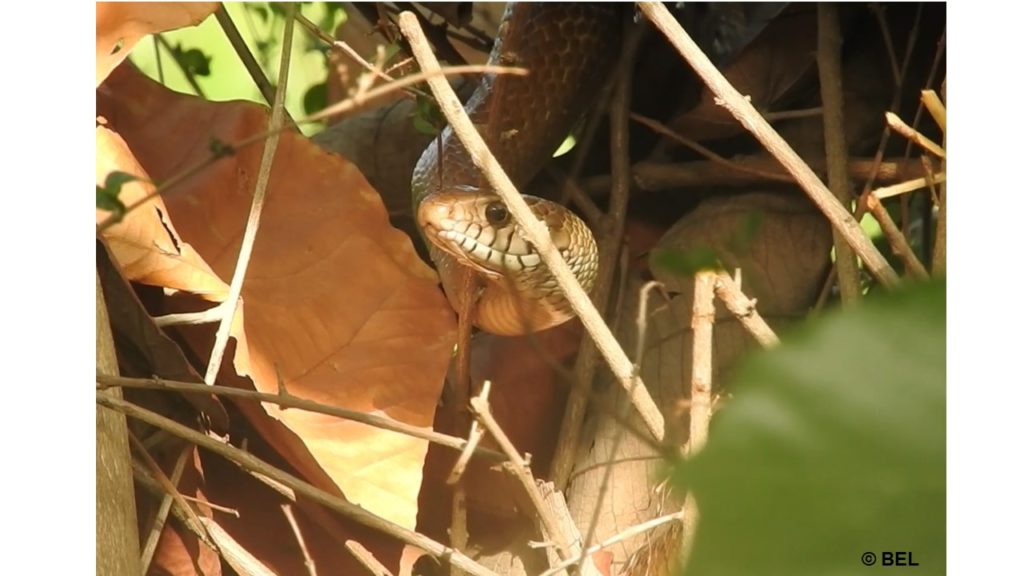 A rat snake descending down from the nest after predation.
A rat snake descending down from the nest after predation.
This is how my love for birds and research took shape..
I was born and brought up in Manipur, a small north-eastern state which is one among the three mega biodiversity hotspots in India. Growing up, I had always been interested in nature. I had mostly studied plants and I was introduced to ornithology very late. At the beginning of my PhD, my supervisor advised me to go in the field and explore by myself, so that I can experience working in the field and understand whether it arouses my own curiosity about nature. So, soon after I joined my PhD programme, I had my first birding experience. I casually accompanied 2nd year BS-MS students of IISER Mohali for a bird walk, which they conduct as a part of their Biology practical. While the BS-MS students could identify almost all bird species that came to our sight, I was standing there among them with zero knowledge of the species of birds other than crow and pigeon. Everyone was busy identifying bird species and I was overwhelmed by the number of species names that I could not even remember. But during the whole walk, the one species that I remember was a set of very dull looking, noisy birds moving in groups, and this one turned out to be the one I did my PhD on. And I could not have been happier about my model system.
It always fascinates me whenever I see a new bird. It makes me think about how little I know about our natural world and how much there is still to explore.
Currently, I am pursuing my PhD degree in Behavioural Ecology under the supervision of Dr. Manjari Jain from IISER Mohali and my study is focused on acoustic communication and the behavioural ecology of Jungle Babblers (JBs). JBs are cooperatively breeding passerines and offer a fantastic model system to study social behaviours. They are a commonly found backyard bird in India. According to the social complexity hypothesis, the vocalizations of social animals are expected to be complex.
I am examining the complexity in their vocal repertoire in terms of the function and structure of calls of JB: whether different vocalizations have different meanings and if they do, then whether these functionally different vocalizations are structurally dissimilar/distinct. I am also looking at patterns of their social and individual behaviours, parental care and brood parasitism.
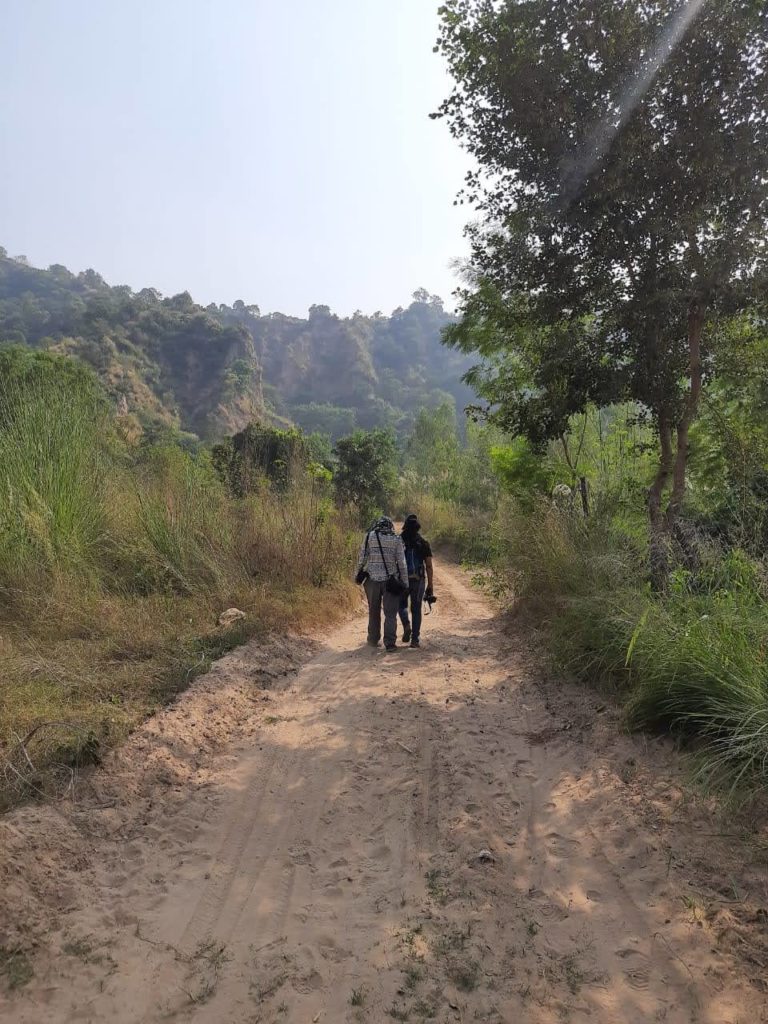 Me and my colleague in search of Babblers at Majrian, Punjab
Me and my colleague in search of Babblers at Majrian, Punjab
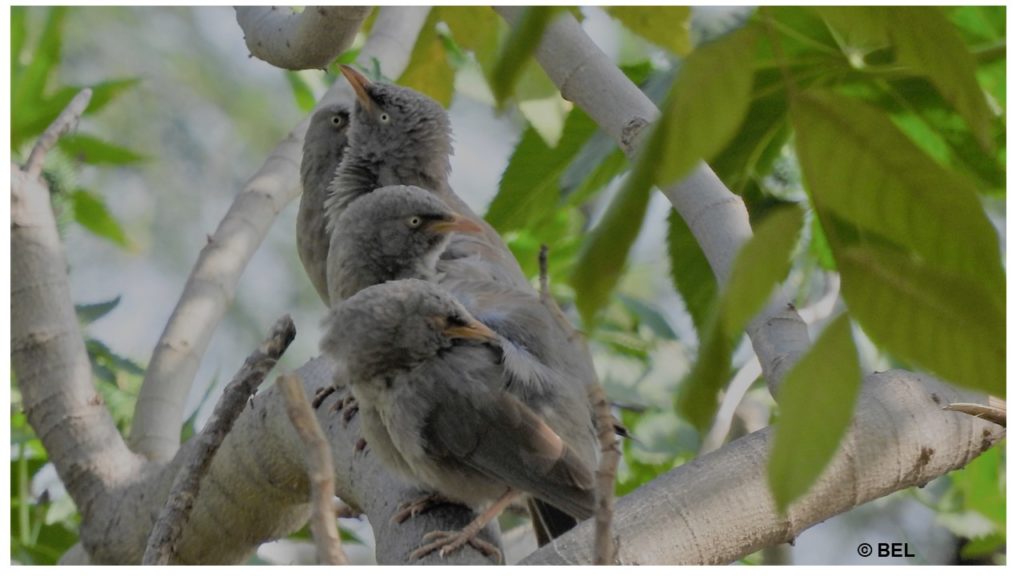 Jungle Babbler exhibiting auto preening and allopreening behaviours
Jungle Babbler exhibiting auto preening and allopreening behaviours
At the beginning of my PhD, I was a little intimidated as I had done my undergraduate and post-graduate in Botany from Delhi University and had little knowledge in this field. However, it did not take me long to get immersed in the behaviour that I had so far only seen on Discovery or National Geographic channel. It was captivating to get real-life experience in the field, even while I was completely unsure of whether I would be able to pull-off something I had never done before. I think it was naturally there in me but was an aspect of me I had not previously had the chance to explore. Observing birds and their surrounding nature every day in the field helped me develop a curiosity about the birds: what are they eating, why some are vocalizing while others are not, why a particular call makes the whole group fly and seek shelter even if it is not the call of its own species and so on. This innate curiosity expressed itself naturally and that is how the decision to follow a career in the field of ornithology was made for me. Until I did it myself, I did not even imagine a career in this field is an option. I now know that it is.
I love what I do because…
Jungle Babblers give me the privilege to work nearby campus and not in faraway places, an advantage of working on a commonly found backyard bird. Even though I have to experience screeching hot summer, humid weather, all those mosquito bites, and those long walks in the field, when I finally find my model system in the field, it makes my day. Above all that, if I observe something new, it relieves all the stress from worrying about finding an adequate method for my research questions or not getting enough sample size. Most importantly, it gives me the opportunity to explore and learn about nature which one cannot get from sitting inside the lab.
It always fascinates me how just by careful observations I can decode the vocalization of a bird. Whenever I hear the call of Jungle Babbler, it always gives me the visual effects of what might be the context of the call. I feel that these are some of the accomplishments of being a field ecologist.
The challenges I faced..
It took me a lot of time to understand the system to work in this field as I was not formerly exposed to and trained in the discipline of field ecology. There are always some questions that do not work out which may be because the model system we are using may not be suitable for the question we are interested in or maybe because there is a limitation of time in carrying out the study. I had to drop some of my questions that required banding and ringing of birds since by the time I learned mist-netting, banding and handling, I was already in my third year. My supervisor and I approached several people to help us with banding but help arrived very late for me. I hope the ornithology fraternity in India will extend help to researchers in need. Only then the field can flourish. I started learning about erecting mist-net and handling bats from Dr. Mahindran Valliyappan even before handling birds. In the end, we learned bird banding from C.K. Vishnudas and our team have banded over 100 babblers in Mohali alone. The pandemic caused by the COVID-19 has affected everyone’s life. It was in the middle of my 5th year of PhD, when COVID-19 struck. Some very crucial field experiments were still remaining and we were stuck in a complete lockdown where all fieldwork was suspended. This continued for 2 years but somehow I managed to finish everything as planned.
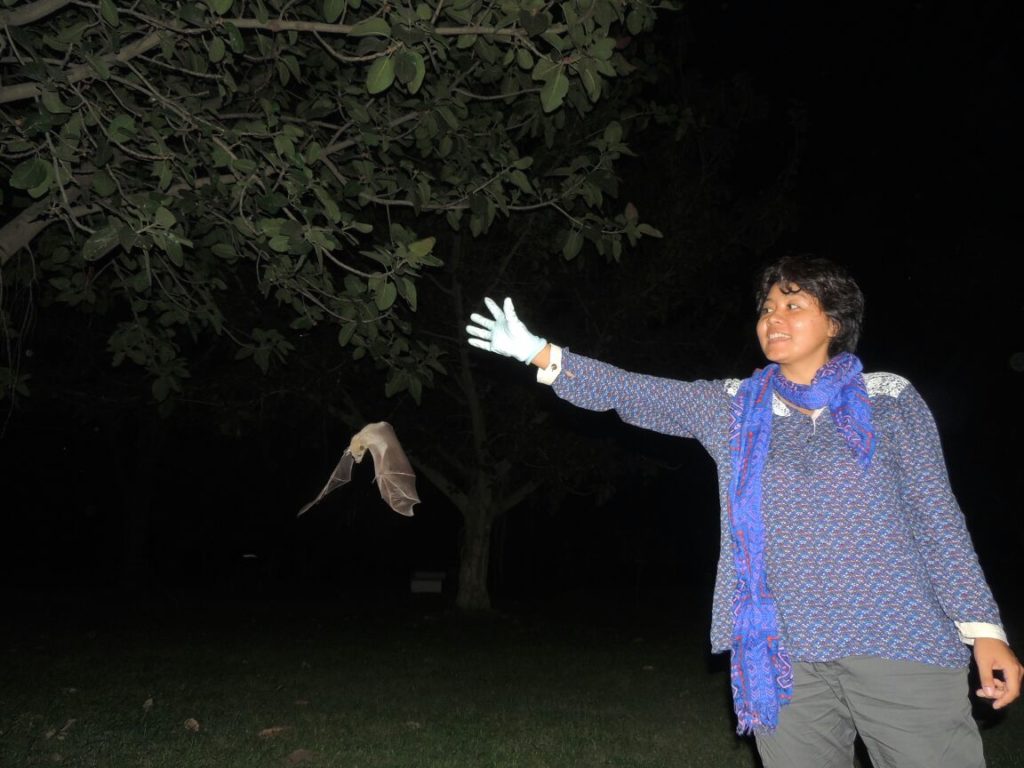 My first experience of erecting mist-net and handling bats while assisting Dr. Mahindran V
My first experience of erecting mist-net and handling bats while assisting Dr. Mahindran V
My advice to young researchers is..
I would suggest that it would be wrong if someone thinks that one can be an ornithologist only if they are simply interested in watching birds. What I mean to say is that if someone wants to make a career in this field then one should also be driven by curiosity, perseverance and be very motivated as fieldwork involves a lot of steps other than simply watching and enjoying the serenity/beauty of nature. Field ornithology is hard work and unlike common perception, it is not a paid vacation. In addition, one should always keep in mind and be prepared for all the troubles that will come in the way of field research such as lack of proper funding, getting permission from the animal ethical department or forest department, or both.
Self-learning is important but one should not be ashamed of asking for help from others and one thing that my model system taught me is being social helps in overcoming your troubles. Lack of proper funding at the right time causes a delay in your study. I guess this one particular challenge has been faced by everybody in this field in one way or another. However, sometimes it also gives us a chance to be creative and develop our own techniques and equipment.
Finally, always bring your required equipment and tools along with you such as binoculars and cameras as you never know when a miracle is going to happen in the field.
Soniya Devi Yambem
[email protected]
PhD Student, Department of Biological Sciences
Indian Institute of Science Education and Research (IISER), Mohali
Twitter: @YambemSoniya

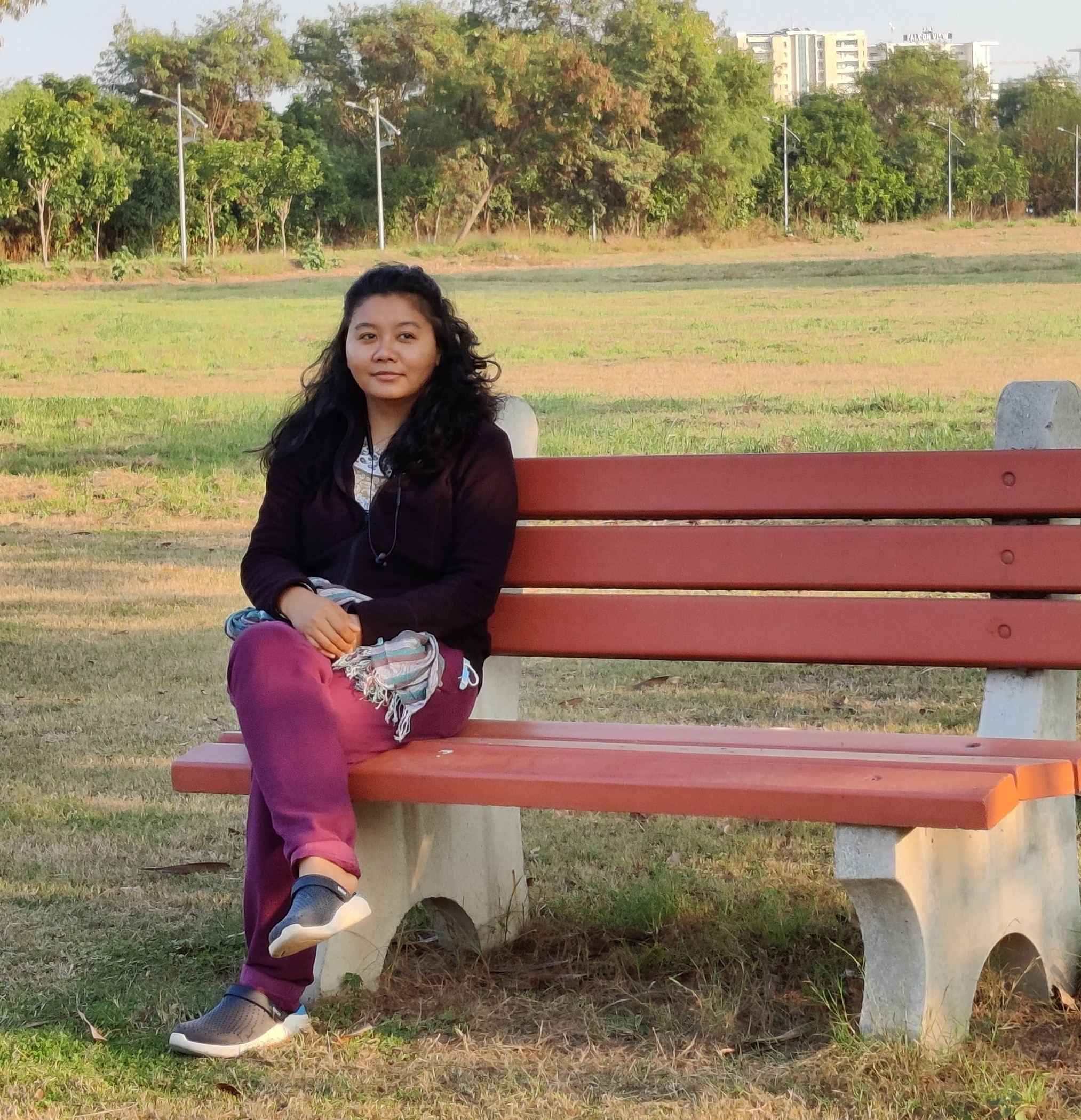
amazing
A great insight 🙂
Your words are truly inspiring ma’am and resourceful.
Beautifully written…very insightful…..
Good to a know that a common species, that we usually take for granted, is being studied in depth. I hope you get some good papers at the end of your work. Good luck!
Interesting work.
Congratulations.